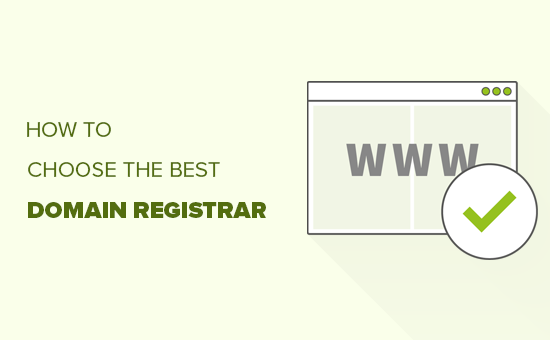Don’t Buy a Domain Name, Read This First! Top Tips Inside
Are you thinking of getting a domain for your website but feeling a bit unsure about which domain registrar to choose? Well, in this article, I’m here to guide you through selecting the best domain registrar so you can buy your favorite domain name in no time.
Not only will I help you with that, but I’ll also walk you through how to pick the best domain registrar and what key factors you should keep in mind when acquiring a new domain. Let’s dive right in!
You might already know what a domain is, but for those who are new to this, let me give them a quick explanation about domains.
Table of Contents
How to Buy a Domain Name – Video Tutorial
For a step-by-step visual tutorial, take a look at this Digit Crafter video that explains how to purchase and register a domain name:
What is a Domain?
A domain name is like an address for a website, helping to locate and identify it on the internet. For example, when you want to visit YouTube, you type “YouTube.com” into your web browser’s address bar. This unique name, such as “google.com” for Google, and “digitcrafter.com” for my website Digit Crafter is what we call a domain name, making it easy to access and recognize websites on the web.
Tips For Buying Domain Names
Before I begin to explain how to buy a domain name, there are some tips you need to focus when buying a domain name.
1- Getting Domain Privacy
When you’re getting a domain from a domain registrar or a hosting company, it’s super important to ensure that you’re securing privacy for your domain.

For example, in above image example, I have a domain “aijobslink.com” in my cart, and I’m getting free domain privacy for it.
Without domain privacy, your contact details like your phone number, home address and email address might be visible to the public. But with domain privacy enabled on your domain, your contact info stays private. It’s a smart move to opt for domain privacy when purchasing your domain to safeguard your personal information.
I’ve been using Namecheap for flipping domains since September 2022. I’m really excited to tell you that I highly recommend Namecheap to my readers and subscribers because I’m not just a customer – I’m a happy user.
You can easily check whether your domain’s contact information is private or public using a tool like Whois.
Just enter your domain information, and it will show you whether your contact details are protected. So, it’s wise to prioritize domain privacy for your online security and peace of mind.
2- Check Domain History
When you register a domain name, it’s yours for a certain period, usually at least a year. If you don’t renew it before it expires, it goes back into the pool for anyone to grab.
If you go for an expired domain, you might get its history along with it. It could be good stuff, like lots of visitors and links from reputable sites, making it valuable. But sometimes, you might pick up a domain with a shady past – think scam sites or malware hubs.
These domains might have been intentionally let go or involved in legal issues. If you end up with one of these, your site could face problems like being blacklisted or getting warnings.
So, before you register a domain, it’s essential to check its history to avoid any negative impacts on your website.
To check if the domain has had any negative reputation or penalties from Google in the past, the best way to do this is by using Google search.
Simply go to google.com and enter the domain name in quotation marks. For instance, if I’m checking the history of “yourdomain.com”, Google will display all relevant records associated with that domain.

3- Length of Domain Name
Let me explain you some tips for creating your domain name.
Keep it Short and Simple
If your domain name is super long, it’s going to be tough for visitors to remember, right? And that could mean fewer people checking out your site. According to domain registrars, the sweet spot for a domain name is between 6 and 14 characters long.
Easy to Memorize
Go for a name that’s easy to remember.
if your domain is tough to spell, chances are not many people will bother typing it in. Take “xylophoneemporium.com” for instance. It’s not registered ’cause, well, who can spell that on the first try? It’s not just about how long the domain is either – even short ones like “syzzyggy.com” can be a spelling nightmare.
Here’s a quick trick to check if your domain is user-friendly: share your idea with a few friends. Just ask them to say it out loud or text it to them and see if they spell it right. If they do it right, you’re good to go. But if not, it might be time to think up something simpler. Don’t forget, your domain isn’t just a fancy name – it needs to be simple enough for your customers to recall and type into their browser easily.
Branding
If it were me, I’d choose a branded domain. Google tends to favor brands, so it’ll help you out. Plus, if your domain includes keywords, it can be tricky to get branded backlinks.
A unique, branded name like “digitcrafter” stands out. If branding isn’t your focus, include important keywords in your domain.
4- Domain Extension
If I’m launching a niche website and there’s a new domain extension that fits perfectly, I’d probably go for it.
I’m sure you’ve come across a ton of websites, and you’ve probably noticed that .com is the go-to domain extension. Others like .org and .net are pretty popular too.
But, the options don’t stop there. You’ve got everything from .xyz to .store to .cafe to .pizza. Just remember, if you go for a more quirky extension, it might not look as pro or trustworthy.
If the .com version is available, go for it. But if it’s taken and you’re dead set on that domain, .org, .net, or .co are solid alternatives.
Generating Domain Names
Using a domain name generator can be a real time-saver because it automatically comes up with loads of ideas for your brand. All you have to do is enter one or two keywords, and you’ve got a bunch of options at your fingertips in no time.
Now, why bother with a domain generator, you ask?
Well, let me break it down for you:
- First off, it does the brainstorming for you. It checks out all sorts of name combos, rhymes, and suggestions that you might not even think of on your own.
- Plus, it checks if the domain names you like are available for purchase. No need to manually search for availability – the tool does it for you.
- And once you find the perfect name, you can register it right away before someone else secure it up. Talk about convenience, right?
Best Domain Name Generators
From what I’ve seen, these domain name generators stand out in the field.
Using AI to Generate Domain Names
Another method to find domain name ideas, you can use an AI content writer tool. I prefer to go to AIwebranker.com and use the AI writer feature. Simply enter your input prompt to get the ideas related to your keywords, like “AI jobs” and you will get a bunch of names related to your target keyword.

How To Choose A Best Domain Registrar?
In this part, I’ll explore the process of getting a domain name in more detail – from finding a registrar to finishing the registration.
What is Domain Registrar?
A domain registrar is a company that takes care of registering and handling domain names. They’re accredited by the Internet Corporation for Assigned Names and Numbers (ICANN), which oversees domain registrations and Domain Name System (DNS) protocols.
Choosing A Reliable Domain Registrar?
Choosing a trustworthy domain registrar is essential for your website’s success. Opting for the wrong one could lead to unexpected fees or even scams.
For instance, some deceitful companies lure users with promises of cheaper domain renewals, only to cheat them later.
With so many options out there, finding the right domain registrar can be tough. Consider these factors when making your choice:
- Honest Pricing: Compare domain costs from different registrars to find the best deal for your budget. Read their reviews from other sources and gather feedback from discussion forums.
- Expiration and renewal policy: Look for registrars that offer auto-renewal or reminders to ensure you don’t lose your domain. Some domain registrars provide 30 days of grace period, it mean if your domain expires, you can still renew it within 30 days after domain expiration.
- Additional services: Choose a registrar that provides helpful extras like free domain privacy protection.
- Domain transfer policy: Check how easy it is to transfer your domain to another provider without hefty fees.
Besides standalone domain registrars, many web hosting and website builder platforms offer free domain registration. For a smoother experience, I recommend purchasing web hosting and a domain name from the same provider. This not only saves money but also simplifies the process, avoiding the hassle of domain transfers.
However, there’s a downside to getting your domain name from the same hosting company. It could end up costing you more for domain transfer fees if you ever need to move your domain to a different registrar.
Best Domain Registrars
When it comes to choosing a domain registrar, you’ve got a few good options. Personally, I’ve tried out three of the best ones:
However, there are other domain registrars if you want to take a look on them, here is the list.
But let me tell you, all my domains are registered with Namecheap, and they’ve been solid. In my experience, Namecheap offers domains for just $5.98 for .com and $11.98 for .net, which is a pretty sweet deal.
Plus, if you ever need to transfer your domain, they only charge $10.48. Another cool thing is they give you a 30-day grace period to renew your domain if it expires. Now, whether you go with GoDaddy, Namecheap, or NameSilo, they’re all top-notch domain providers. The choice is yours.
Related: A detailed review about Namecheap
Registering Your Domain
If you decide to go with Namecheap like me, it’s super easy to register a domain. Here is the step-by-step guide to register domain with Namecheap.
Step 1: Go to Namecheap and signup for your account.

Step 2: Enter your information and click on “Create Account and Continue.”

After successful registration, you’ll be redirected to the Namecheap account management page, and they’ll also send a welcome email to your inbox.
Step 3: Type in your domain, let say “Aijobslink” and click “Search.”

If you see a grayed-out X, it means the domain name has already been registered by someone else. If you see a green tick, it means the domain is available to purchase.
Step 4: Now you are cart page, be sure to select Auto Renew and Domain Privacy and click on confirm order.

Step 5: Enter payment details, such as debit or credit card information.

Step 6: Review your order details and proceed to click on Pay Now button.

Congratulations, the domain is yours! It’s really that simple.
The only part that might take some time is finding the perfect domain name, but with a bit of research, you’ll find the best one for your site.
Final Thoughts
A website’s domain name is like its address on the internet and plays a big role in branding. So, it’s crucial to choose a good one for your online business.
When coming up with a domain name, keep it short, easy to remember, and ready for the future. Use a domain name generator to find available options. Also, check trademark databases to avoid legal issues.
Here’s a quick summary of the steps to buy a new domain name:
- Find a trustworthy domain name registrar.
- Check if your desired domain is available.
- Choose the right domain name.
- Complete the registration process.
- Confirm ownership of the domain.
- Consider enabling privacy protection.
Alternatively, you can buy an already registered domain name by contacting the owner and making an offer.
It’s convenient to buy a domain name from a web hosting provider, as they often offer free domain names with their plans. But if you’ve bought your domain elsewhere, you can still connect it to your new web hosting account.
I hope this guide has helped you understand how to buy a domain name. If you have any questions, feel free to leave a comment below.
Disclosure: This blog article contains affiliate links, and if you make a purchase through these links, I may earn a commission at no additional cost to you. Your support through these links helps sustain and improve the content on this platform.





